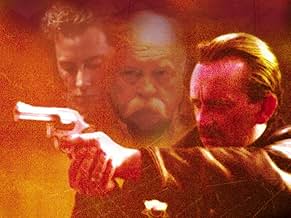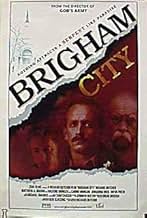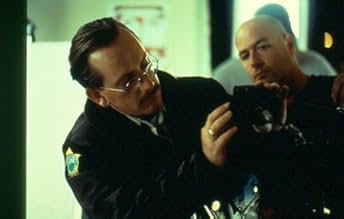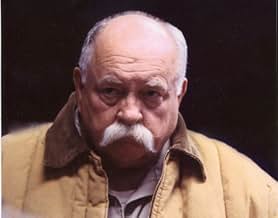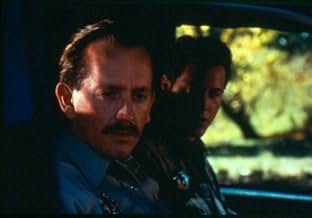IMDb RATING
6.6/10
1.7K
YOUR RATING
The sheriff of a small Utah community searches for a serial killer.The sheriff of a small Utah community searches for a serial killer.The sheriff of a small Utah community searches for a serial killer.
- Awards
- 3 wins total
Wendy Hoop
- April
- (as Wendy Gardiner)
- Director
- Writer
- All cast & crew
- Production, box office & more at IMDbPro
Featured reviews
It's difficult to watch Richard Dutcher's very capable and entertaining, `Brigham City,' without choking on the intended Mormon zeitgeist that permeates the story. Dutcher goes to considerable length to successfully portray Mormons as loving, decent, church-going friends and neighbors as justification for suspending constitutional rights and imposing a theocracy.
Dutcher plays Wes Clayton, Sheriff of a fictional small town in Utah called Brigham City. Clayton is also the `Bishop' for Mormons in that area, which makes him unquestionably the most influential man in town. A widower who lost his wife and only son in a traffic accident years ago, Clayton is permanently saddened by the loss. Dutcher portrays him with a kindly stoicism, a righteous man who takes both his sacred and secular responsibilities seriously.
When a young woman from California is found murdered in an old barn on the outskirts of town, Clayton calls in the FBI and washes his hands of the investigation, telling his enthusiastic young deputy that this has nothing to do with Brigham City, that it was a random act that could have happened on any number of freeway off ramps. It's something Clayton desperately wants to believe; that Brigham City is a paradise of the faithful and as a result enjoys a divine immunity from the evil `out there' in the world. His duty as both Sheriff and Bishop is to keep it that way. Unfortunately, a second body is discovered, and Clayton is forced to realize that his `Eden' has been invaded by the outside world, and his duty now requires him to get involved.
His ensuing investigation makes your skin crawl. Clayton's methodology is autocratic and fascist. His first suspicion is that the murderer must be an outsider or a `Jack Mormon;' consequently, he and his deputies hang out at the only bar in town, collecting beer bottles and glasses to dust for fingerprints, hoping for a match from the FBI database. When the town's convenience store clerk disappears, Clayton ratchets up the police state, using his authority as Bishop to order church members to go out two by two, as in their missionary days, and search every house in town, lack of a search warrant notwithstanding. When one of them objects by saying he has to be at work, Clayton responds that nothing is more important than the life of the missing girl. When one of the town members rightfully refuses to allow a search of her house, he forces his way in.
Despite deep faith, good intentions, and concern for another human life, fascism in the name of Jesus is still fascism. Clayton's heavy-handedness is precisely why the Bill of Rights exists. While `Brigham City' is a good movie in terms of characterization and story, it is also a very frightening parable about the dangers of religion, and remarkably parallels our nation's attitude and course of action in the aftermath of September 11th. Essentially, `Brigham City' is a microcosm of what the christian right ultimately envisions as America's future, and it's no place where I'd want to live.
Dutcher plays Wes Clayton, Sheriff of a fictional small town in Utah called Brigham City. Clayton is also the `Bishop' for Mormons in that area, which makes him unquestionably the most influential man in town. A widower who lost his wife and only son in a traffic accident years ago, Clayton is permanently saddened by the loss. Dutcher portrays him with a kindly stoicism, a righteous man who takes both his sacred and secular responsibilities seriously.
When a young woman from California is found murdered in an old barn on the outskirts of town, Clayton calls in the FBI and washes his hands of the investigation, telling his enthusiastic young deputy that this has nothing to do with Brigham City, that it was a random act that could have happened on any number of freeway off ramps. It's something Clayton desperately wants to believe; that Brigham City is a paradise of the faithful and as a result enjoys a divine immunity from the evil `out there' in the world. His duty as both Sheriff and Bishop is to keep it that way. Unfortunately, a second body is discovered, and Clayton is forced to realize that his `Eden' has been invaded by the outside world, and his duty now requires him to get involved.
His ensuing investigation makes your skin crawl. Clayton's methodology is autocratic and fascist. His first suspicion is that the murderer must be an outsider or a `Jack Mormon;' consequently, he and his deputies hang out at the only bar in town, collecting beer bottles and glasses to dust for fingerprints, hoping for a match from the FBI database. When the town's convenience store clerk disappears, Clayton ratchets up the police state, using his authority as Bishop to order church members to go out two by two, as in their missionary days, and search every house in town, lack of a search warrant notwithstanding. When one of them objects by saying he has to be at work, Clayton responds that nothing is more important than the life of the missing girl. When one of the town members rightfully refuses to allow a search of her house, he forces his way in.
Despite deep faith, good intentions, and concern for another human life, fascism in the name of Jesus is still fascism. Clayton's heavy-handedness is precisely why the Bill of Rights exists. While `Brigham City' is a good movie in terms of characterization and story, it is also a very frightening parable about the dangers of religion, and remarkably parallels our nation's attitude and course of action in the aftermath of September 11th. Essentially, `Brigham City' is a microcosm of what the christian right ultimately envisions as America's future, and it's no place where I'd want to live.
The worst thing about going to a mystery movie, is to have the perpetrator revealed too quickly. Brigham City is able to keep its secrets well enough that while you are convinced you know who the guilty party is, you don't find out until the last few moments of the film.
The other engaging aspect of the movie is that it also wisely utilizes both the setting (a small Utah town) and the cultural and religious traditions of the mormon church. Mormons are a group that are often denigrated and little understood by most of American Society. Dutcher is able to successfully integrate Mormon traditions of worship and belief into the plot. While some may find this to be too blatant at times, I think he is able to successfully balance his desire to use this as a backdrop for his murder mystery.
As someone who lived in Utah for about two years, I thought Dutcher was very able to capture many aspects of contemporary Rural Utah/Mormon Culture that are quite unique....so if you would like to understand a little more about mormonism, without inviting the Mormon Missionaries into your home, I think this is a great way to do it, while being entertained at the same time, by a great WHODUNIT plot.
The other engaging aspect of the movie is that it also wisely utilizes both the setting (a small Utah town) and the cultural and religious traditions of the mormon church. Mormons are a group that are often denigrated and little understood by most of American Society. Dutcher is able to successfully integrate Mormon traditions of worship and belief into the plot. While some may find this to be too blatant at times, I think he is able to successfully balance his desire to use this as a backdrop for his murder mystery.
As someone who lived in Utah for about two years, I thought Dutcher was very able to capture many aspects of contemporary Rural Utah/Mormon Culture that are quite unique....so if you would like to understand a little more about mormonism, without inviting the Mormon Missionaries into your home, I think this is a great way to do it, while being entertained at the same time, by a great WHODUNIT plot.
7=G=
Sleepy little Utah town and Mormon enclave Brigham City questions its faith as it loses its innocence to a serial killer. An excellent mutlilayered one-man-band indie, "Brigham City" works well as a whodunit, even better as a human drama, and still better as a provocative examination of issues of faith in the presence of evil. A tad obvious, somewhat sanitized, and not without its plotholes, "BC" should be an entertaining and worthwhile watch for most mature adults into serious-minded drama irrespective of faith. (B)
First and foremost, Brigham City is a murder mystery. But it's also a story about how a murder can make victims of everyone who lives in a small town that is supposed to be safe.
While Brigham City is set in a predominantly Mormon town in Utah, but it could just have easily been any small town in America and the people could have been of any faith (or none at all). The people of the town feel safe and secure. No one locks they're doors. Everyone knows everyone else. Then their sense of security is shattered by a spree of vicious murders. Suddenly everyone is on his guard and quick to distrust those they have trusted for years.
The plot of Brigham City really has the feel of a traditional Hollywood thriller, the addition of Mormon culture give the film a higher level of depth. While the film is about Mormons and provides some brief glimpses into their beliefs and customs, it does not attempt to convert audience members to the LDS church.
In his second film, Richard Dutcher does an admirable job of bringing this story to the big screen. The film feels more professional and polished than his previous entry (God's Army), but at the same time doesn't feel like the typical Hollywood fare.
What works in this movie is Dutcher's attention to detail and the depth of the characters. I was pleased to see how the violence in the movie was implied rather than shown directly. I was also impressed by the casting of Wilford Brimley. There may have been a commercial reason for him being attached to the film, but his presence gave the film a feeling of familiarity.
Dutcher also makes great use of camera angles and music to cast each person as a suspect. This is also the film's low point, as it is used so much it begins to bog down the story. Non-Mormons may feel that certain points of the movie are a bit too preachy.
All in all, Brigham City is a decent movie. I don't recommend it for younger children, as some of the implied violence may be disturbing, but most people over 13 will probably be drawn into the story the same way you would a traditional Hollywood thriller.
You might ask why I (a non-Mormon) interested in seeing Brigham City. Since I manage the movie theater where the film is playing I wanted to be able to give an informed opinion about the movie. As a movie fan, I was interested to see how Brigham City stood up to other Hollywood and independent films. As a person, I was interested for the glimpse of Mormon culture the film provided.
While Brigham City is set in a predominantly Mormon town in Utah, but it could just have easily been any small town in America and the people could have been of any faith (or none at all). The people of the town feel safe and secure. No one locks they're doors. Everyone knows everyone else. Then their sense of security is shattered by a spree of vicious murders. Suddenly everyone is on his guard and quick to distrust those they have trusted for years.
The plot of Brigham City really has the feel of a traditional Hollywood thriller, the addition of Mormon culture give the film a higher level of depth. While the film is about Mormons and provides some brief glimpses into their beliefs and customs, it does not attempt to convert audience members to the LDS church.
In his second film, Richard Dutcher does an admirable job of bringing this story to the big screen. The film feels more professional and polished than his previous entry (God's Army), but at the same time doesn't feel like the typical Hollywood fare.
What works in this movie is Dutcher's attention to detail and the depth of the characters. I was pleased to see how the violence in the movie was implied rather than shown directly. I was also impressed by the casting of Wilford Brimley. There may have been a commercial reason for him being attached to the film, but his presence gave the film a feeling of familiarity.
Dutcher also makes great use of camera angles and music to cast each person as a suspect. This is also the film's low point, as it is used so much it begins to bog down the story. Non-Mormons may feel that certain points of the movie are a bit too preachy.
All in all, Brigham City is a decent movie. I don't recommend it for younger children, as some of the implied violence may be disturbing, but most people over 13 will probably be drawn into the story the same way you would a traditional Hollywood thriller.
You might ask why I (a non-Mormon) interested in seeing Brigham City. Since I manage the movie theater where the film is playing I wanted to be able to give an informed opinion about the movie. As a movie fan, I was interested to see how Brigham City stood up to other Hollywood and independent films. As a person, I was interested for the glimpse of Mormon culture the film provided.
I thoroughly enjoyed this one. I watched it knowing it wasn't going to be a light-hearted film, which was an advantage over many people I know who went to it thinking it was a happy ending sort of show. I must admit it was a little odd to see the goings-on of LDS church meetings and other LDS cultural aspects on the big screen, but it is territory that needs to be covered so that future movies that cover similar territory won't be weighed down with reviews about the LDS church rather than focusing on the movie at hand. I watched the DVD a second time with Richard Dutcher's audio commentary and, after that, I concluded that he is someone who is conscientious about finding the balance in film in regards to the religious issues dealt with, not too pro or too anti. I was quite amazed as to how resourceful he was, considering their meager budget he had to work with. The outcome was superb and he told the story in a simple, yet elegant way. I look forward to Mr. Dutcher's next film.
Did you know
- TriviaNone of the actors or crew knew whom the real murderer was prior to the last scene being filmed. The actors and crew filming the scene had to sign a contract saying they would not reveal which one of them played the murderer, until after the movie was officially released.
- GoofsAfter Wes deputizes Stu and gives him a badge, Stu doesn't wear it for the rest of the movie.
- SoundtracksBanjo Boy
Written by Ryan Shupe
Performed by Ryan Shupe & the Rubberband
Copyright ©1999 Ryan Shupe (BMI)
Courtesy of Tydal Wave Records
- How long is Brigham City?Powered by Alexa
Details
- Release date
- Country of origin
- Official site
- Language
- Also known as
- Бригам-сити
- Filming locations
- Production company
- See more company credits at IMDbPro
Box office
- Budget
- $1,000,000 (estimated)
- Gross US & Canada
- $852,206
- Opening weekend US & Canada
- $103,629
- Apr 8, 2001
- Gross worldwide
- $852,206
- Runtime
- 1h 59m(119 min)
- Color
- Sound mix
- Aspect ratio
- 1.85 : 1
Contribute to this page
Suggest an edit or add missing content


